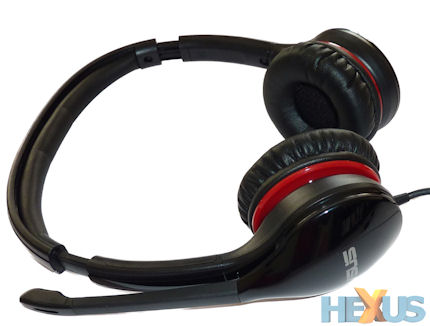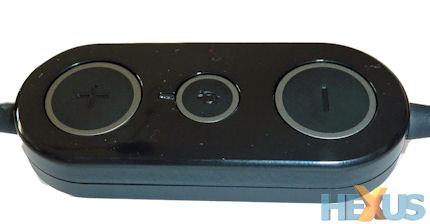Bring the bass
New tricksThere is little in the way of exclusive PC territory any more. Large manufacturers are muscling their way into every segment that can be used to turn a profit. A case in point is the burgeoning USB gaming headset business, where ASUS is hoping to cash-in with the CineVibe headset.
Presented in the same style as most USB gaming headsets, the CineVibe uses 30mm drivers that are wrapped inside rather small pads which push directly on to your ears rather than sit around them. The upshot of the design is a tight-fitting headset that becomes uncomfortable if worn for more than 20 minutes, especially if, like this author, you happen to wear glasses.
Connectivity is as simple as plugging the USB port into your PC or laptop and then waiting for the operating system to recognise it. The headset has the necessary digital-to-analogue convertor built-in, meaning the audio processing is all done without the need for a dedicated soundcard.
Plumbed in a foot down the six-foot USB cable is the in-line remote control. The two large buttons control the volume, while a central button is used to silence the microphone. A side-mounted switch brings the CineVibe's secret into play.
Make me feel it
ASUS provides scant information on the workings of the non-detachable microphone, and one is left to ferret around in Device Manager to locate and tune the mic's sensitivity level. Coming back to the headset, the £40 CineVibe's main claim to fame rests with the secret sauce: rumble-feedback. ASUS reckons that the best method of providing deep, rich bass from a relatively inexpensive headset is to really make you feel it. To this end, the 30mm drivers noticeably vibrate as the audio level is increased, to the extent that the feedback is all too apparent in bass-heavy tracks.
Switch the rumble-feedback option off and Carlos Santana's Smooth is reasonably clear and precise at medium-volume levels. There's some muddying at the low-end of the spectrum, which is not apparent on the pin-sharp Corsair HS1 (£75, mind), together with a slight lack of clarity in the treble, but it's more than listenable. Activate the rumble-feedback and the drivers begin a merry jiggle once the volume is pumped up. Indeed, the movement, which is surprisingly potent, feels decidedly strange and makes the ears tingle, as if someone is tapping on the lobes.
Bring the volume to near-maximum and the boomy bass of the CineVibe's feedback overshadows vocals. Granted, it works best on tracks that are made for bass: Leftfield's Phat Planet's lines are delivered with force, literally, yet the rumble-feedback feature is an acquired taste. We found ourselves turning it off when playing games or watching movies, quickly tiring from the too-heavy bass and vibrations.
Work in progress
What ASUS really needs to do with the CineVibe is to roll in user-customisable EQ settings, letting you define the kind of sound you want. This way, we believe, the rumble-feedback can be used to better effect. Given that no software is shipped with the unit, there's no method of turning the stereo headset into a pseudo 5.1-channel set of cans, although we're probably asking a little much appreciating the £40 price-tag.
The CineVibe rumble-feedback headset represents a good idea that is still a work in progress. We'd recommend ASUS looks at increasing the drivers to 50mm; attaching larger, round-the-ear pads, and fine-tuning the feedback via EQ settings. As it is, the £40 CineVibe headset is decent, if unremarkable.
The Good
Bass can be devilishly low
Vocals are clear (without rumble-feedback)
Rumble-feedback is a cool gimmick
The Bad
Rumble-feedback is very much an acquired taste
Not comfortable if used for long periods
USB-only connection
HEXUS Rating

ASUS CineVibe USB gaming headset
HEXUS Where2Buy
The ASUS CineVibe USB gaming headset can be purchased from SCAN.co.uk* for around £40.
HEXUS Right2Reply
At HEXUS, we invite the companies whose products we test to comment on our articles. If any company representatives for the products reviewed choose to respond, we'll publish their commentary here verbatim.
*As always, UK-based HEXUS.community forum members will benefit from the SCAN2HEXUS Free Shipping initiative, which will save you a further few pounds plus also top-notch, priority customer service and technical support backed up by the SCANcare@HEXUS forum.








